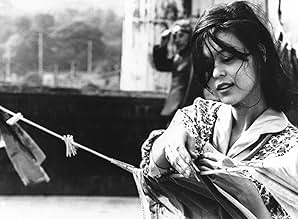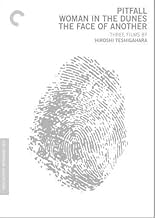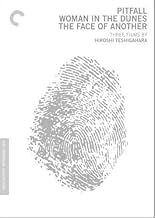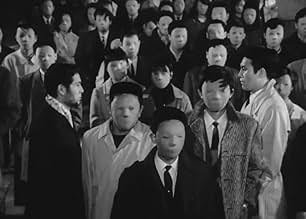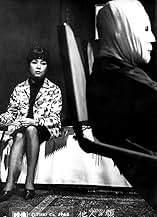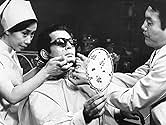A businessman with a disfigured face obtains a lifelike mask from his doctor, but the mask starts altering his personality.A businessman with a disfigured face obtains a lifelike mask from his doctor, but the mask starts altering his personality.A businessman with a disfigured face obtains a lifelike mask from his doctor, but the mask starts altering his personality.
- Awards
- 2 wins total
Robert Dunham
- Foreign man in Bar
- (uncredited)
Featured reviews
After an industrial accident that leaves his face disfigured for life, Mr. Okuyama (Tatsuya Nakadai)begins to question the meaning of life and his own identity, should he keep working, will his disgusted wife ever sleep with him again. His psychotherapist offers him the chance to avail of an illegal medical practice that he has invented, it's a mask moulded from the face of another, that Okuyama can wear to live life a little more normally. The mask gives him a new lease of life, but his therapist warns him that the mask could take over and influence him to do evil things. As the mask takes control Okuyama can't resist but to give in to his baser instincts, his main plan being, to seduce own wife, that he believes may be cheating on him anyway. With thematic echoes of Franju's Les Yeux sans visage and even Delmer Daves Dark Passage, Teshigahara delivers his expressionistic adaptation of Kôbô Abe's novel with style, the results being a dark and epic tale that will haunt its viewers. Its full of inventive visuals and clever tricks with sound, which along with Tôru Takemitsu's superb score contribute wonderfully to the theme of how fragile identity really is and how the masks we all wear hide our true beings and souls. There's also a secondary story of an unnamed facially deformed girl, who is also struggling to cope with her disfigurements and her tragedy is equally moving.
movie about self perception and the bond between the mind and the body...soundtrak really set the mood for the increasing horror in the story line. Nakadai downplays his role to give an overall flawless performance. Watch for some really good lines which will undoubtedly force the viewer to start thinking right away which may distract from the plot (but hey, it's an artsy masterpiece right?)...There is a lot of experimentation in the cinematography such as a door which opens and reveals a cluster of hair in ocean tides...this effect serves to foreshadow the action but may in the view of modern audiences comes across as trying TOO hard to be an art film. I left the movie still trying to link the two parallel story lines in the film and you may too...but don't worry you get two stories for the price of one...DO NOT watch this movie in the dark even though there is nothing VISUALLY terrifying it is still a great horror film...
Mr. Okuyama (Tatsuya Nakadai) is a physically and emotionally wounded man. After an industrial accident at work, his face has been scarred and mutilated beyond recognition, and even his wife rejects him, even though she says his physical appearance doesn't matter. It has left him bitter and angry, until his psychiatrist Dr. Hira (Mikijiro Hira) comes up with a way to fashion a 'face mask' that will give him the appearance of having a completely normal face, albeit with a few joining marks. Hira doesn't do this just out of kindness, he is fascinated how this new face will alter Okuyama's personality and way of life.
The Face of Another is a fascinating film that highlights the social attitudes to physical appearance. There are hundreds of films and morality tales that teach you that it is inner beauty that counts, and once you allow this to shine then your physical attractiveness becomes irrelevant. Everyone knows that this is bullshit, so its refreshing to see a film that makes it clear from the outset that physical appearance has a massive part to play in society. Okuyama's new face, which is an attractive one, changes him so much that he takes on an almost dual identity. Dr. Hira delights in telling him that he has bought flashy new clothes, something he was never concerned with before. It becomes clear that whilst before Okuyama merely wanted to be normal again and fit back in society, his new face is engulfing him, and to be 'normal' simply isn't enough anymore.
As with many of the Japanese New Wave film-makers of the 1960's-70's, director Hiroshi Teshigahara takes some bold steps and sneaks in some surrealist and art-house values in a movie that is otherwise played relatively straight. A 'fictional' character appears every now and then throughout (she is first imagined by Okuyama's wife as a character in a movie); one side of her face is scarred and burned. She appears quite rarely, but seems to serve as an alternative to Okuyama's increasingly vain soul. Another scene seems a ball of hair that floats in the air, unnoticed by the people in the laboratory. I have no idea what it meant, and couldn't really admit to it being wholly successful, but it certainly got my attention nonetheless.
A powerful, disturbing, and poignant drama/horror from the greatest era in Japanese cinema. The film seems all the more important now, 45 years on, in a world where a botox injection can be as easy as buying a pack of cigarettes, and where physical 'beauty' is less a bonus than a necessity.
www.the-wrath-of-blog.blogspot.com
The Face of Another is a fascinating film that highlights the social attitudes to physical appearance. There are hundreds of films and morality tales that teach you that it is inner beauty that counts, and once you allow this to shine then your physical attractiveness becomes irrelevant. Everyone knows that this is bullshit, so its refreshing to see a film that makes it clear from the outset that physical appearance has a massive part to play in society. Okuyama's new face, which is an attractive one, changes him so much that he takes on an almost dual identity. Dr. Hira delights in telling him that he has bought flashy new clothes, something he was never concerned with before. It becomes clear that whilst before Okuyama merely wanted to be normal again and fit back in society, his new face is engulfing him, and to be 'normal' simply isn't enough anymore.
As with many of the Japanese New Wave film-makers of the 1960's-70's, director Hiroshi Teshigahara takes some bold steps and sneaks in some surrealist and art-house values in a movie that is otherwise played relatively straight. A 'fictional' character appears every now and then throughout (she is first imagined by Okuyama's wife as a character in a movie); one side of her face is scarred and burned. She appears quite rarely, but seems to serve as an alternative to Okuyama's increasingly vain soul. Another scene seems a ball of hair that floats in the air, unnoticed by the people in the laboratory. I have no idea what it meant, and couldn't really admit to it being wholly successful, but it certainly got my attention nonetheless.
A powerful, disturbing, and poignant drama/horror from the greatest era in Japanese cinema. The film seems all the more important now, 45 years on, in a world where a botox injection can be as easy as buying a pack of cigarettes, and where physical 'beauty' is less a bonus than a necessity.
www.the-wrath-of-blog.blogspot.com
Teshigahara has never shied away from examining the more unsettling dimensions of human experience. With the trilogy of full-length collaborations with Kobo Abe, Teshigahara encapsulated the Kafkaesque hellishness of quotidian life, the yawning, gaping chasm of emptiness that lies beneath the veneer of stability.
The ubiquitous influence of the French absurdists/existentialists, Kafka and Dostoevsky looms large here- one is reminded most often of Sartre's "No Exit", R.D. Laing's "Knots" and Dostoevsky's "Crime And Punishment". Sartre, Laing and Abe all underline how little autonomy we really have over constituting our own identities- often, we may find that we exist only as beings-for-others, entirely 'encrusted' within personas not of our own making, but assigned to us. For Okuyama and the unnamed scarred woman, they are imprisoned in their vulgar corporeality. Met with revulsion everywhere, they come to accept ugliness as an indelible mark of their being. Trapped within the oppressive confines of flesh, they cannot evade the pity and repugnance that their countenances arouse. It is little wonder that Okuyama becomes self-lacerating and embittered.
Throughout the film, the viewer confronts how precarious identity truly is- the assumption that selves are continuous and linear from day-to-day rests entirely on the visage. The doctor's paroxysm of inspiration in the beer hall affords a glimpse into the anarchic potential of his terrible invention, one that would rend civilization asunder. Indeed, the final epiphany is particularly unnerving- "some masks come off, some don't". We all erect facades, smokescreens of self that we maintain with great effort.
Beneath the epidermis, as Okuyama discovers, is vacuity and nihility. This is likely the explanation for Okuyama's gratuitous, Raskolnikov-esquire acts of crime at the conclusion of the film- faced with the frontierless void of freedom, he desires to be apprehended and branded by society. Integration into society, after all, requires a socially-assigned, unified role, constituted by drivers licenses, serial numbers and criminal records. Without such things, Okuyama is a non-entity.
Aesthetically, the film exhibits all the rigour and poetry of Teshigahara's other work. Cocteau, Ernst and Duchamp, in particular, are notable wellsprings for the film's visual grammar. Literate, expressionistic and profoundly disorienting, this might be my favorite Teshigahara work.
The ubiquitous influence of the French absurdists/existentialists, Kafka and Dostoevsky looms large here- one is reminded most often of Sartre's "No Exit", R.D. Laing's "Knots" and Dostoevsky's "Crime And Punishment". Sartre, Laing and Abe all underline how little autonomy we really have over constituting our own identities- often, we may find that we exist only as beings-for-others, entirely 'encrusted' within personas not of our own making, but assigned to us. For Okuyama and the unnamed scarred woman, they are imprisoned in their vulgar corporeality. Met with revulsion everywhere, they come to accept ugliness as an indelible mark of their being. Trapped within the oppressive confines of flesh, they cannot evade the pity and repugnance that their countenances arouse. It is little wonder that Okuyama becomes self-lacerating and embittered.
Throughout the film, the viewer confronts how precarious identity truly is- the assumption that selves are continuous and linear from day-to-day rests entirely on the visage. The doctor's paroxysm of inspiration in the beer hall affords a glimpse into the anarchic potential of his terrible invention, one that would rend civilization asunder. Indeed, the final epiphany is particularly unnerving- "some masks come off, some don't". We all erect facades, smokescreens of self that we maintain with great effort.
Beneath the epidermis, as Okuyama discovers, is vacuity and nihility. This is likely the explanation for Okuyama's gratuitous, Raskolnikov-esquire acts of crime at the conclusion of the film- faced with the frontierless void of freedom, he desires to be apprehended and branded by society. Integration into society, after all, requires a socially-assigned, unified role, constituted by drivers licenses, serial numbers and criminal records. Without such things, Okuyama is a non-entity.
Aesthetically, the film exhibits all the rigour and poetry of Teshigahara's other work. Cocteau, Ernst and Duchamp, in particular, are notable wellsprings for the film's visual grammar. Literate, expressionistic and profoundly disorienting, this might be my favorite Teshigahara work.
Mr. Okuyama is involved in an accident at work which melts off his face and this understandably is constantly nagging him. This makes a mark on the relationship with his wife as he talks out at her about how miserable he is and what a monster he has become. He then talks his psychiatrist into making him a new face (which was quite easily done since the psychiatrist has had these kind of thoughts before) and he then goes on 'vacation'.
This is so excellent in every way. It is not a sci-fi movie, but in feel it sometimes comes close to. The images are quite surreal at times, the music is out of this world and some of the sets are not to be found in real life.
The editing is masterfully done, switching between main story and a parallel story about a girl with a similar problem, as well as switching between hand-held camera (not too shaky though), still pictures and still standing camera. The pictures of Segawa Hiroshi fits 35mm nicely, sometimes manipulating the background like I haven't seen before for example when the psychiatrist and Mr. Okayama is talking at the club and the crowd behind get 'invisible' by lighting.
Kyou Machiko did a terrific job in Ozu's 'Ukigusa' and likewise here. Too bad we don't see that much of her. Nakudai Tatsuya plays well as the mask. I don't know exactly what was special effects and not, but it was hard to tell.
Author and writer of screenplay Abe Koubou, director Teshigahara Hiroshi and Takemitsu Touru was behind another favourite of mine; 'Suna no Onna'. They also made 'Moetsukita Chizu' and I cant wait to get my hands on it!!
This is so excellent in every way. It is not a sci-fi movie, but in feel it sometimes comes close to. The images are quite surreal at times, the music is out of this world and some of the sets are not to be found in real life.
The editing is masterfully done, switching between main story and a parallel story about a girl with a similar problem, as well as switching between hand-held camera (not too shaky though), still pictures and still standing camera. The pictures of Segawa Hiroshi fits 35mm nicely, sometimes manipulating the background like I haven't seen before for example when the psychiatrist and Mr. Okayama is talking at the club and the crowd behind get 'invisible' by lighting.
Kyou Machiko did a terrific job in Ozu's 'Ukigusa' and likewise here. Too bad we don't see that much of her. Nakudai Tatsuya plays well as the mask. I don't know exactly what was special effects and not, but it was hard to tell.
Author and writer of screenplay Abe Koubou, director Teshigahara Hiroshi and Takemitsu Touru was behind another favourite of mine; 'Suna no Onna'. They also made 'Moetsukita Chizu' and I cant wait to get my hands on it!!
Did you know
- TriviaDirector Hiroshi Teshigahara said that he intended the film to explore both personal and cultural identities. While the examination of personal identity is quite overt, Teshigahara also explored how Japan's cultural identity had been impacted by World War II and its aftermath.
- Quotes
Psychiatrist: You're not the only lonely man. Being free always involves being lonely. Just there is a mask you can peel off and another you can not.
- ConnectionsReferenced in Les Funérailles des roses (1969)
- How long is The Face of Another?Powered by Alexa
Details
Box office
- Gross worldwide
- $35,185
- Runtime2 hours 2 minutes
- Color
- Sound mix
- Aspect ratio
- 1.33 : 1
Contribute to this page
Suggest an edit or add missing content




